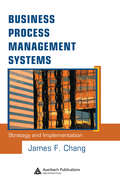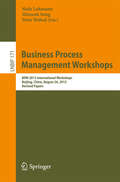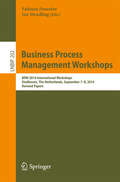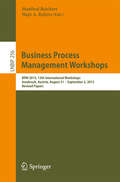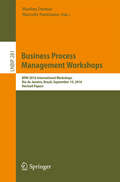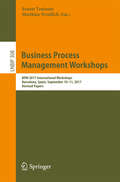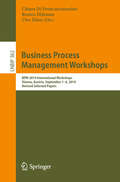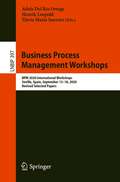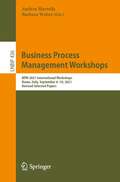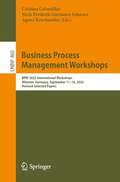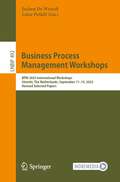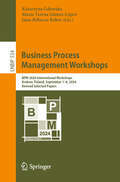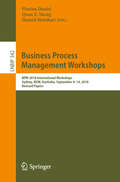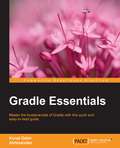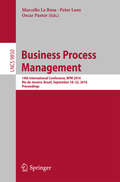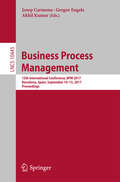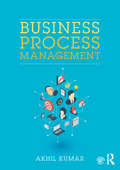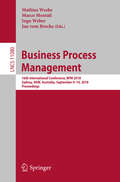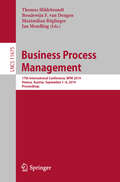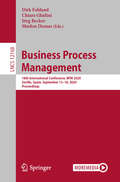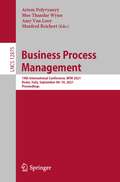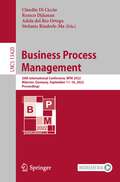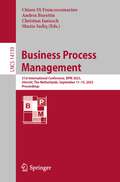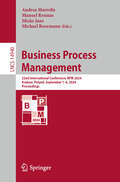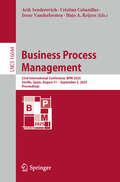- Table View
- List View
Business Process Management Systems: Strategy and Implementation
by James F. ChangWith a focus on strategy and implementation, James Chang discusses business management practices and the technology that enables them. He analyzes the history of process management practices and demonstrates that BPM practices are a synthesis of radical change and continuous change practices. The book is relevant to both business and IT professi
Business Process Management Workshops: BPM 2013 International Workshops, Beijing, China, August 26, 2013, Revised Papers (Lecture Notes in Business Information Processing #171)
by Niels Lohmann Minseok Song Petia WohedThis book constitutes the refereed proceedings of nine international workshops held in Beijing, China, in conjunction with the 11th International Conference on Business Process Management, BPM 2013, in August 2013. The nine workshops comprised Business Process Intelligence (BPI 2013), Business Process Management and Social Software (BPMS2 2013), Data- and Artifact-Centric BPM (DAB 2013), Decision Mining and Modeling for Business Processes (DeMiMoP 2013), Emerging Topics in Business Process Management (ETBPM 2013), Process-Aware Logistics Systems (PALS 2013), Process Model Collections: Management and Reuse (PMC-MR 2013), Security in Business Processes (SBP 2013) and Theory and Applications of Process Visualization (TAProViz 2013). The 38 revised full papers presented were carefully reviewed and selected from 74 submissions.
Business Process Management Workshops: BPM 2014 International Workshops, Eindhoven, The Netherlands, September 7-8, 2014, Revised Papers (Lecture Notes in Business Information Processing #202)
by Jan Mendling Fabiana FournierThis book constitutes the refereed proceedings of ten international workshops held in Eindhoven, The Netherlands, in conjunction with the 12th International Conference on Business Process Management, BPM 2014, in September 2014. The ten workshops comprised Process-oriented Information Systems in Healthcare (ProHealth 2014), Security in Business Processes (SBP 2014), Process Model Collections: Management and Reuse (PMC-MR 2014), Business Processes in Collective Adaptive Systems (BPCAS 2014), Data- and Artifact-centric BPM (DAB 2014), Business Process Intelligence (BPI 2014), Business Process Management in the Cloud (BPMC 2014), Theory and Applications of Process Visualization (TaProViz 2014), Business Process Management and Social Software (BPMS2 2014) and Decision Mining and Modeling for Business Processes (DeMiMoP 2014). The 38 revised full and eight short papers presented were carefully reviewed and selected from 84 submissions. In addition, six short papers resulting from the Doctoral Consortium at BPM 2014 are included in this book.
Business Process Management Workshops: BPM 2015, 13th International Workshops, Innsbruck, Austria, August 31 – September 3, 2015, Revised Papers (Lecture Notes in Business Information Processing #256)
by Manfred Reichert Hajo A. ReijersThis book constitutes the refereed proceedings of ten international workshops held in Innsbruck, Austria, in conjunction with the 13th International Conference on Business Process Management, BPM 2015, in September 2015. The seven workshops comprised Adaptive Case Management and other Non-workflow Approaches to BPM (AdaptiveCM 2015), Business Process Intelligence (BPI 2015), Social and Human Aspects of Business Process Management (BPMS2 2015), Data- and Artifact-centric BPM (DAB 2015), Decision Mining and Modeling for Business Processes (DeMiMoP 2015), Process Engineering (IWPE 2015), and Theory and Applications of Process Visualization (TaProViz 2015). The 42 revised papers presented were carefully reviewed and selected from 104 submissions. In addition, four short papers and one keynote (from TAProViz) are also included in this book.
Business Process Management Workshops: BPM 2016 International Workshops, Rio de Janeiro, Brazil, September 19, 2016, Revised Papers (Lecture Notes in Business Information Processing #281)
by Marlon Dumas Marcelo FantinatoThis book constitutes the revised papers of the ten international workshops that were held at BPM 2016, the 14th International Conference on Business Process Management, held in Rio de Janeiro, Brazil, in September 2016. The 36 papers included in this volume were carefully reviewed and selected from a total of 64 submissions. They are from the following workshops: BPI 2016 - 12th International Workshop on Business Process Intelligence; BPMO 2016 - 1st Workshop on Workshop on Business Process Management and Ontologies; BPMS2 2016 - 9th Workshop on Social and Human Aspects of Business Process Management; DeMiMoP 2016 - 4th International Workshop on Decision Mining & Modeling for Business Processes; IWPE 2016 - 2nd International Workshop on Process Engineering; PQ 2016 - 1st International Workshop on Process Querying; ReMa 2016 - 1st Workshop on Resource Management in Business Processes; PRAISE 2016 - 1st International Workshop on Runtime Analysis of Process-Aware Information Systems; SABPM 2016 - 1st International Workshop on Sustainability-Aware Business Process Management; TAProViz 2016 - 5th International Workshop on Theory and Application of Visualizations and Human-centric Aspects in Processes.
Business Process Management Workshops: BPM 2017 International Workshops, Barcelona, Spain, September 10-11, 2017, Revised Papers (Lecture Notes in Business Information Processing #308)
by Matthias Weidlich Ernest TenienteThis book constitutes revised papers from the eleven International Workshops held at the 15th International Conference on Business Process Management, BPM 2017, in Barcelona, Spain, in September 2017: BPAI 2017 - 1st International Workshop on Business Process Innovation with Artificial Intelligence; BPI 2017 - 13th International Workshop on Business Process Intelligence; BP-Meet-IoT 2017 - 1st International Workshop on Ubiquitous Business Processes Meeting Internet-of-Things; BPMS2 2017 - 10th Workshop on Social and Human Aspects of Business Process Management; ‐ CBPM 2017 - 1st International Workshop on Cognitive Business Process Management; CCABPM 2017 - 1st International Workshop on Cross-cutting Aspects of Business Process Modeling; DeHMiMoP 2017 - 5th International Workshop on Declarative/Decision/Hybrid Mining & Modeling for Business Processes; QD-PA 2017 - 1st International Workshop on Quality Data for Process Analytics; REBPM 2017 - 3rd International Workshop on Interrelations between Requirements Engineering and Business Process Management; SPBP 2017 - 1st Workshop on Security and Privacy-enhanced Business Process Management; TAProViz-PQ-IWPE 2017 -Joint International BPM 2017 Workshops on Theory and Application of Visualizations and Human-centric Aspects in Processes (TAProViz'17), Process Querying (PQ'17) and Process Engineering (IWPE17). The 44 full and 11 short papers presented in this volume were carefully reviewed and selected from 99 submissions.
Business Process Management Workshops: BPM 2019 International Workshops, Vienna, Austria, September 1–6, 2019, Revised Selected Papers (Lecture Notes in Business Information Processing #362)
by Uwe Zdun Remco Dijkman Chiara Di FrancescomarinoThis book constitutes revised papers from the twelve International Workshops held at the 17th International Conference on Business Process Management, BPM 2019, in Vienna, Austria, in September 2019:The third International Workshop on Artificial Intelligence for Business Process Management (AI4BPM)The third International Workshop on Business Processes Meet Internet-of-Things (BP-Meet-IoT)The 15th International Workshop on Business Process Intelligence (BPI)The first International Workshop on Business Process Management in the era of Digital Innovation and Transformation (BPMinDIT)The 12th International Workshop on Social and Human Aspects of Business Process Management (BPMS2)The 7th International Workshop on Declarative, Decision and Hybrid approaches to processes (DEC2H)The second International Workshop on Methods for Interpretation of Industrial Event Logs (MIEL)The first International Workshop on Process Management in Digital Production (PM-DiPro)The second International Workshop on Process-Oriented Data Science for Healthcare (PODS4H)The fourth International Workshop on Process Querying (PQ)The second International Workshop on Security and Privacy-enhanced Business Process Management (SPBP)The first International Workshop on the Value and Quality of Enterprise Modelling (VEnMo)Each of the workshops discussed research still in progress and focused on aspects of business process management, either a particular technical aspect or a particular application domain. These proceedings present the work that was discussed during the workshops.
Business Process Management Workshops: BPM 2020 International Workshops, Seville, Spain, September 13–18, 2020, Revised Selected Papers (Lecture Notes in Business Information Processing #397)
by Adela Del Río Ortega Henrik Leopold Flávia Maria SantoroThis book constitutes revised papers from the International Workshops held at the 18th International Conference on Business Process Management, BPM 2020, during September 13-18, 2020. The conference was planned to take place in Seville, Spain, but changed to an online format due to the COVID-19 pandemic.Papers from the following workshops are included: Workshop on Security and Privacy-Enhanced Business Process Management (SPBP 2020) Workshop on Social and Human Aspects of Business Process Management (BPMS2 2020) Workshop on Business Processes Meet the Internet-of Things (BP-Meet-IoT 2020) Workshop on Artificial Intelligence for Business Process Management (AI4BPM 2020) Workshop BPM in the Era of Digital Innovation and Transformation (BPMinDIT 2020) Workshop on Business Process Intelligence (BPI 2020) Workshop on Declarative, Decision and Hybrid Approaches to Processes (DEC2H 2020) Each of the seven workshops focused on particular aspects of business process management, either from a technical or from a domain perspective. Overall, after a thorough review process there were 28 full and 1 short paper selected from 53 submissions.
Business Process Management Workshops: BPM 2021 International Workshops, Rome, Italy, September 6–10, 2021, Revised Selected Papers (Lecture Notes in Business Information Processing #436)
by Barbara Weber Andrea MarrellaThis book constitutes revised papers from the International Workshops held at the 19th International Conference on Business Process Management, BPM 2021, in Rome, Italy, during September 6-10, 2021. Papers from the following workshops are included:5th International Workshop on Artificial Intelligence for Business Process Management (AI4BPM'21)17th International Workshop on Business Process Intelligence (BPI'21)1st International Workshop on BPM Governance for and Beyond DigitalTransformation (BPMGOV'21)1st International Workshop on Business Process Management and Routine Dynamics (BPM&RD'21)14th International Workshop on Social and Human Aspects of Business Process Management (BPMS2'21)9th International Workshop on DEClarative, DECision and Hybrid approaches to processes (DEC2H'21)5th International Workshop on Business Processes Meet the Internet-of-Things (BP-Meet-IoT'21)4th International Workshop on Security and Privacy-enhanced Business Process Management (SPBP'21)Each of the eight workshops focused on particular aspects of business process management. Overall, after a thorough review process, there were 31 full papers selected from a total of 60 submissions.
Business Process Management Workshops: BPM 2022 International Workshops, Münster, Germany, September 11–16, 2022, Revised Selected Papers (Lecture Notes in Business Information Processing #460)
by Agnes Koschmider Cristina Cabanillas Niels Frederik Garmann-JohnsenThis book constitutes revised papers from the International Workshops held at the 20th International Conference on Business Process Management, BPM 2022, in Münster, Germany, during September 11-15, 2022. Papers from the following workshops are included:· 6th International Workshop on Artificial Intelligence for Business Process Management (AI4BPM 2022)· 6th International Workshop on Business Processes Meet Internet-of-Things (BP-Meet-IoT 2022)· 18th International Workshop on Business Process Intelligence (BPI 2022)· 2nd International Workshop on Business Process Management and Routine Dynamics (BPM&RD 2022)· 14th International Workshop on Social and Human Aspects of Business Process Management (BPMS2 2022) · 1st International Workshop on Data-Driven Business Process Optimization (BPO 2022) · 10th International Workshop on DEClarative, DECision and Hybrid approaches to processes (DEC2H 2022) · 1st International Workshop on Natural Language Processing for Business Process Management (NLP4BPM 2022) Each of the eight workshops focused on particular aspects of business process management. Overall, after a thorough review process, there were 23 full and 3 short papers selected from a total of 51 submissions. Only one of the short papers is included in the proceedings.
Business Process Management Workshops: BPM 2023 International Workshops, Utrecht, The Netherlands, September 11–15, 2023, Revised Selected Papers (Lecture Notes in Business Information Processing #492)
by Jochen De Weerdt Luise PufahlThis book constitutes revised papers from the International Workshops held at the 21st International Conference on Business Process Management, BPM 2023, in Utrecht, The Netherlands, during September 2023.Papers from the following workshops are included:• 7th International Workshop on Artificial Intelligence for Business Process Management (AI4BPM 2023)• 7th International Workshop on Business Processes Meet Internet-of-Things (BP-Meet-IoT 2023)• 19th International Workshop on Business Process Intelligence (BPI 2023)• 16th International Workshop on Social and Human Aspects of Business Process Management (BPMS2 2023)• 2nd International Workshop on Data-Driven Business Process Optimization (BPO 2023)• 11th International Workshop on Declarative, Decision and Hybrid Approaches to Processes (DEC2H 2023)• 1st International Workshop on Digital Twins for Business Processes (DT4BP 2023)• 1st International Workshop on Formal Methods for Business Process Management (FM-BPM 2023) • 2nd International Workshop on Natural Language Processing for Business Process Management (NLP4BPM 2023)• 1st International Workshop on Object-Centric Processes from A to Z (OBJECTS 2023)• 3rd International Workshop on Change, Drift, and Dynamics of Organizational Processes (ProDy 2023) Each of the workshops focused on particular aspects of business process management. Overall, after a thorough review process, 42 full papers were selected from a total of 86 submissions.
Business Process Management Workshops: BPM 2024 International Workshops, Krakow, Poland, September 1–6, 2024, Revised Selected Papers (Lecture Notes in Business Information Processing #534)
by María Teresa Gómez-López Jana-Rebecca Rehse Katarzyna GdowskaThis book constitutes revised papers from the International Workshops held at the 22nd International Conference on Business Process Management, BPM 2024, in Krakow, Poland, during September 2024. Each of the workshops focused on particular aspects of business process management. Overall, after a thorough review process, 28 full papers and 2 short papers were selected from a total of 64 submissions. Papers from the following workshops are included: 8th International Workshop on Artificial Intelligence for Business Process Management (AI4BPM 2024) 3rd International Workshop on Data-Driven Business Process Optimization (BPO 2024) 8th International Workshop on Business Processes Meet Internet-of-Things (BP-Meet-IoT 2024) 17th International Workshop on Social and Human Aspects of Business Process Management (BPMS2 2024) 3rd International Workshop on Natural Language Processing for Business Process Management (NLP4BPM 2024) International Workshop on Object-centric Processes from A to Z (OBJECTS 2024) 2nd International Workshop on Change, Drift, and Dynamics of Organizational Processes (ProDy 2024) 1st International Workshop on Managing Process Innovation and Value Creation in the Era of Digital Transformation (Innov8BPM 2024)
Business Process Management Workshops: Bpm 2018 International Workshops Sydney, NSW, Australia, September 9–14, 2018, Revised Papers (Lecture Notes in Business Information Processing #342)
by Quan Z. Sheng Florian Daniel Hamid MotahariThis book constitutes revised papers from the eight International Workshops held at the 16th International Conference on Business Process Management, BPM 2018, in Sydney, Australia, in September 2018: BPI 2018: 14th International Workshop on Business Process Intelligence; BPMS2 2018: 11th Workshop on Social and Human Aspects of Business Process Management;‐ PODS4H 2018: 1st International Workshop on Process-Oriented Data Science for Healthcare; AI4BPM 2018: 1st International Workshop on Artificial Intelligence for Business Process Management; CCBPM 2018: 1st International Workshop on Emerging Computing Paradigms and Context in Business Process Management; BP-Meet-IoT / PQ 2018: Joint Business Processes Meet the Internet-of-Things and Process Querying Workshop; DeHMiMoP 2018: 1st Declarative/Decision/Hybrid Mining and Modelling for Business Processes Workshop; REBM /EdForum 2018: Joint Requirements Engineering and Business Process Management Workshop and Education Forum The 45 full papers presented in this volume were carefully reviewed and selected from 90 submissions.
Business Process Management with JBoss jBPM
by Matt CumberlidgeThis book takes a practical approach, with step-by-step instructions for business process management, model creation, and implementation. The book uses a typical BPM project lifecycle case study to explore and explain the process in a realistic situation. This is a book for Business Analysts (BAs) who need to develop a process model for implementation in a business process management system. Developers looking at the JBoss jBPM toolset will also find it a useful introduction to the key concepts. This book is a full toolkit for someone who wants to implement BPM in the right way. This toolkit is particularly aimed at Business Analysts, although Project Managers, IT managers, developers, and even business people can expect to find useful tools and techniques in here. We will present the project framework, analysis techniques and templates, BPM technology and example deliverables that you need to successfully bring a BPM solution into your organization.
Business Process Management: 14th International Conference, BPM 2016, Rio de Janeiro, Brazil, September 18-22, 2016. Proceedings (Lecture Notes in Computer Science #9850)
by Oscar Pastor Marcello La Rosa Peter LoosBusiness Process Management (BPM) is the art and science of how work should be performed in an organization in order to ensure consistent outputs and to take advantage of improvement opportunities, e. g. reducing costs, execution times or error rates. Importantly, BPM is not about improving the way individual activities are performed, but rather about managing entire chains of events, activities and decisions that ultimately produce added value for an organization and its customers. This textbook encompasses the entire BPM lifecycle, from process identification to process monitoring, covering along the way process modelling, analysis, redesign and automation. Concepts, methods and tools from business management, computer science and industrial engineering are blended into one comprehensive and inter-disciplinary approach. The presentation is illustrated using the BPMN industry standard defined by the Object Management Group and widely endorsed by practitioners and vendors worldwide In addition to explaining the relevant conceptual background, the book provides dozens of examples, more than 100 hands-on exercises - many with solutions - as well as numerous suggestions for further reading. The textbook is the result of many years of combined teaching experience of the authors, both at the undergraduate and graduate levels as well as in the context of professional training. Students and professionals from both business management and computer science will benefit from the step-by-step style of the textbook and its focus on fundamental concepts and proven methods. Lecturers will appreciate the class-tested format and the additional teaching material available on the accompanying website fundamentals-of-bpm. org.
Business Process Management: 15th International Conference, Bpm 2017, Barcelona, Spain, September 10-15, 2017, Proceedings (Lecture Notes in Computer Science #10445)
by Gregor Engels Josep Carmona Akhil KumarThis book constitutes the proceedings of the BPM Forum from the International Conference on Business Process Management, BPM 2017, held in Barcelona, Spain, September 2017. The BPM Forum hosts innovative research which has a high potential of stimulating discussions. The papers selected for the forum are expected to showcase fresh ideas from exciting and emerging topics in BPM, even if they are not yet as mature as the regular papers at the conference. The volume contains 11 full papers carefully reviewed and selected from 97 submissions. Each paper was reviewed by a team comprising of a senior PC and four regular PC members who engage in a discussion phase after the initial reviews were prepared. The authors eventually receive four review reports, and a meta-review that summarizes the reviews and the discussion. The selected papers cover topics related to process models and metrics, mining and compliance, and to other innovative ideas such as gamification, smart devices and digital innovation as far as they pertain to BPM.
Business Process Management: 15th International Conference, Bpm 2017, Barcelona, Spain, September 10-15, 2017, Proceedings (Lecture Notes in Computer Science #10445)
by Akhil KumarThis book introduces students to business process management, an approach that aims to align the organization’s business processes with the demands of the marketplace. Processes serve as a coordination mechanism, and the aim of business process management is to improve the organization’s effectiveness and efficiency in adapting to change, and maintaining competitive advantage. In Business Process Management, Kumar argues for the value of looking at businesses as a collection of processes that cut across departments, and for breaking down functional silos. The book provides an overview of the basic concepts in this field before moving on to more advanced topics such as process verification, flexible processes, process security and evaluation, resource assignment, and social networks. The book concludes with an examination of the future directions of the discipline. Blending a strong grounding in current research with a focus on concepts and tools, Business Process Management is an accessible textbook full of practical examples and cases that will appeal to upper level students.
Business Process Management: 16th International Conference, BPM 2018, Sydney, NSW, Australia, September 9–14, 2018, Proceedings (Lecture Notes in Computer Science #11080)
by Jan Vom Brocke Mathias Weske Marco Montali Ingo WeberThis book constitutes the proceedings of the 16th International Conference on Business Process Management, BPM 2018, held in Sydney, Australia, in September 2018. The 27 papers presented in this volume were carefully reviewed and selected from 140 submissions. They were organized in topical sections named: reflections on BPM; concepts and methods in business process modeling and analysis; foundations of process discovery; alignments and conformance checking; process model analysis and machine learning; digital process innovation; and method analysis and selection.
Business Process Management: 17th International Conference, BPM 2019, Vienna, Austria, September 1–6, 2019, Proceedings (Lecture Notes in Computer Science #11675)
by Thomas Hildebrandt Jan Mendling Maximilian Röglinger Boudewijn F. van DongenThis book constitutes the proceedings of the 17th International Conference on Business Process Management, BPM 2019, held in Vienna, Austria, in September 2019. The 23 full and 4 tutorial short papers included in this volume were carefully reviewed and selected from 115 submissions. The papers were organized in topical sections named: foundations; engineering; and management.
Business Process Management: 18th International Conference, BPM 2020, Seville, Spain, September 13–18, 2020, Proceedings (Lecture Notes in Computer Science #12168)
by Jörg Becker Marlon Dumas Chiara Ghidini Dirk FahlandThis book constitutes the proceedings of the 18th International Conference on Business Process Management, BPM 2020, held in Seville, Spain, in September 2020. The conference was held virtually due to the COVID-19 pandemic. The 27 full papers included in this volume were carefully reviewed and selected from 125 submissions. Two full keynote papers are also included. The papers are organized in topical sections named: foundations; engineering; and management.
Business Process Management: 19th International Conference, BPM 2021, Rome, Italy, September 06–10, 2021, Proceedings (Lecture Notes in Computer Science #12875)
by Amy Van Looy Manfred Reichert Artem Polyvyanyy Moe Thandar WynnThis volume constitutes the refereed proceedings of the 19th International Conference on Business Process Management, BPM 2021, held in Rome, Italy, in September 2021. The 23 full papers, one keynote paper, and 4 tutorial papers presented in this volume were carefully reviewed and selected from 92 submissions. The papers are organized in topical sections named: foundations, engineering, and management.
Business Process Management: 20th International Conference, BPM 2022, Münster, Germany, September 11–16, 2022, Proceedings (Lecture Notes in Computer Science #13420)
by Stefanie Rinderle-Ma Remco Dijkman Claudio Di Ciccio Adela del Río OrtegaThis book constitutes the refereed proceedings of the 20th International Conference on Business Process Management, BPM 2022, which took place in Münster, Germany, in September 2022. The 22 papers included in this book were carefully reviewed and selected from 98 submissions. They were organized in topical sections as follows: task mining; design methods; process mining; process mining practice; analytics; and systems. The book also includes one keynote talk in full-paper length and 5 tutorial papers.
Business Process Management: 21st International Conference, BPM 2023, Utrecht, The Netherlands, September 11–15, 2023, Proceedings (Lecture Notes in Computer Science #14159)
by Andrea Burattin Shazia Sadiq Chiara Di Francescomarino Christian JanieschThis book constitutes the refereed proceedings of the 21st International Conference on Business Process Management, BPM 2023, which took place in Utrecht, The Netherlands, in September 2023. The 27 papers included in this book were carefully reviewed and selected from 151 submissions. They were organized in three main research tracks: Foundations, engineering, and management.
Business Process Management: 22nd International Conference, BPM 2024, Krakow, Poland, September 1–6, 2024, Proceedings (Lecture Notes in Computer Science #14940)
by Michael Rosemann Andrea Marrella Manuel Resinas Mieke JansThis book constitutes the refereed proceedings of the 22nd International Conference on Business Process Management, BPM 2024, which took place in Krakow, Poland, in September 2024. The 29 full papers included in this book were carefully reviewed and selected from 144 submissions. They were organized in topical sections as follows: Foundations; Engineering; and Management. .
Business Process Management: 23rd International Conference, BPM 2025, Seville, Spain, August 31 – September 5, 2025, Proceedings (Lecture Notes in Computer Science #16044)
by Hajo A. Reijers Cristina Cabanillas Arik Senderovich Irene VanderfeestenThis book constitutes the refereed proceedings of the 23rd International Conference on Business Process Management, BPM 2025, which took place in Seville, Spain, in September 2025. The 30 full papers included in this book were carefully reviewed and selected from 132 submissions. They were organized in topical sections on foundation, engineering, and management.
